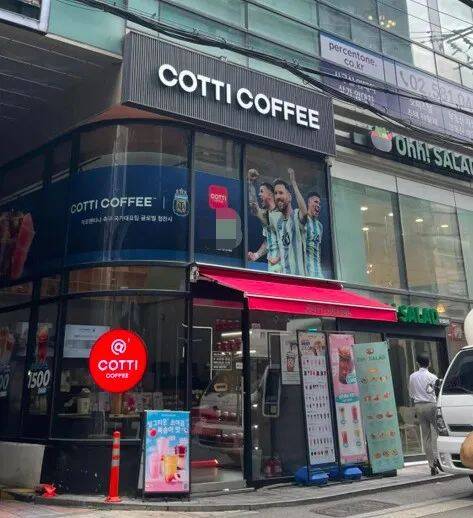Stores are closed! Kudi is suspected of withdrawing from the Korean market?!
▲
Click follow | Daily boutique coffee culture magazine coffee workshop
Recently, a Chinese coffee shop closed down in South Korea on a social platform. " The post aroused the attention and discussion of netizens.
The poster in South Korea said that when he passed the store opened by Kudi in the new village of Seoul recently, he found that the coffee shop, which was supposed to be brightly lit, was closed and it was dark inside. She walked up and saw the notice on the door and learned that the store had closed on November 10.
This scene can not help but recall that the day before the store closed, he went to the store to redeem points and asked the clerk if he had any Muffin as usual. She said there was a touch of sadness in the clerk who received her at that time, but did not tell herself the news that the store was about to close. Because of this, the poster was surprised when he noticed that the store was not open normally.
(the above picture is the original text of the notice, and the following picture is the machine translation.)
For South Koreans, coffee has long been an indispensable drink in their life and work. According to a report by South Korea's Central Daily in July, South Korea's per capita annual coffee consumption in 2023 was 405 cups, more than double the global average of 152 cups.
Coffee consumption above the global average naturally means that there is a vast local coffee market. So in August last year, Kudi chose South Korea as its first overseas market, opening direct stores in Gangnam, Xincun and other places in Seoul.

At that time, netizens understood Kudi's move to go to sea, but they were not optimistic about it. There is no denying that Koreans who "have iced American coffee in their blood" are in great demand for coffee. At the same time, the volume of the Korean coffee market is serious, and the competition in the industry is no less fierce than that in China. The number of local coffee shops is numerous and densely distributed, which can be described as "one coffee shop in three steps".
Although Kudi is one of the representative brands of affordable coffee in China, which meets the local consumer demand for large quantities of coffee drinks at high prices, many people still think that "Qiang long can't beat the ground snake." Kudi, who is stationed in the South Korean market, may find it difficult to compete with local brands.

Now the facts in front of us also seem to confirm the prediction put forward by netizens that "it feels like Kudi can't live in Korea." South Korean netizens in the comment area revealed that in addition to the new village store, Kudi's Jiangnan store has also been closed. "the shop assistant told me that Jiangnan has also been closed, and if the new village is closed, it will be delisted."
Through the order interface of Kudi South Korea, the two stores that can be queried have been closed, one of which is the Xincun store mentioned in the post. However, there is no official information on whether Kudi will withdraw from the South Korean market completely.
Local netizens have different views on the reasons why Kudi closed its shop quietly. "there are many street coffee shops in Korea, and Kudi is not competitive."the Korean management of Kudi is all Chinese who do not study and live in Korea, and the publicity method does not listen to the suggestions of part-time students."you have to download all kinds of app before you can order, and the ordering process is more annoying."
They said that in South Korea, which is full of cafes, Kudi is "not satisfied with soil and water", the taste of the product is not in line with the preferences of local coffee lovers, and ordering and publicity have also failed to cater to the consumption habits of the local people. Under the influence of multiple factors, even if Kudi is a well-known chain brand in China, it is not surprising that it is difficult to survive in the coffee market in South Korea.
Picture from: Internet
Disclaimer: some of the pictures in this article come from the network, and some of the contents of the website, such as pictures, we will respect the origin of the original copyright, but due to the large number, there will be individual pictures and texts not in time to indicate, please forgive me. If the original author has any disputes can contact the website to deal with, once verified we will immediately correct, by the "coffee workshop" collation and editing, reprint please indicate, if infringement, please inform deletion, thank you ~!
Important Notice :
前街咖啡 FrontStreet Coffee has moved to new addredd:
FrontStreet Coffee Address: 315,Donghua East Road,GuangZhou
Tel:020 38364473
- Prev

If you want it, just get it directly?! Is Starbucks Red Cup no longer popular?
▲ Click to pay attention| Daily Boutique Coffee Culture Magazine Coffee Workshop As soon as Halloween passes, Starbucks fans begin to look forward to the brand's unique year-end atmosphere item "Starbucks Red Cup." Since its launch in 1997, this festive red cup with Christmas elements has arrived in November every year as scheduled, serving as a warm drink in winter.
- Next

Historical high! NYSE coffee beans quoted today at 279.3
At the close of trading today, the closing price of U.S. Type C coffee futures, the benchmark for the coffee bean industry, soared again, reaching 284.93 cents/pound at its peak, and finally closing at 279.35 cents/pound, breaking the record once again. At the end of September this year, the price of U.S. Type C coffee futures reached 2.
Related
- What grade does Jamaica Blue Mountain No. 1 coffee belong to and how to drink it better? What is the highest grade of Blue Mountain coffee for coffee aristocrats?
- What are the flavor characteristics of the world-famous coffee Blue Mountain No. 1 Golden Mantelin? What are the characteristics of deep-roasted bitter coffee?
- Can I make coffee a second time in an Italian hand-brewed mocha pot? Why can't coffee be brewed several times like tea leaves?
- Hand-brewed coffee flows with a knife and a tornado. How to brew it? What is the proportion of grinding water and water temperature divided into?
- What is the difference between Indonesian Sumatra Mantinin coffee and gold Mantinin? How to distinguish between real and fake golden Mantelin coffee?
- What does bypass mean in coffee? Why can hand-brewed coffee and water make it better?
- Unexpected! Ruixing Telunsu lattes use a smoothie machine to foam milk?!
- % Arabia's first store in Henan opens into the village?! Netizen: Thought it was P's
- Does an authentic standard mocha coffee recipe use chocolate sauce or powder? Mocha Latte/Dirty Coffee/Salty Mocha Coffee Recipe Share!
- What is the difference between Vietnam egg coffee and Norway egg coffee? Hand-brewed single product coffee filter paper filter cloth filter flat solution!

